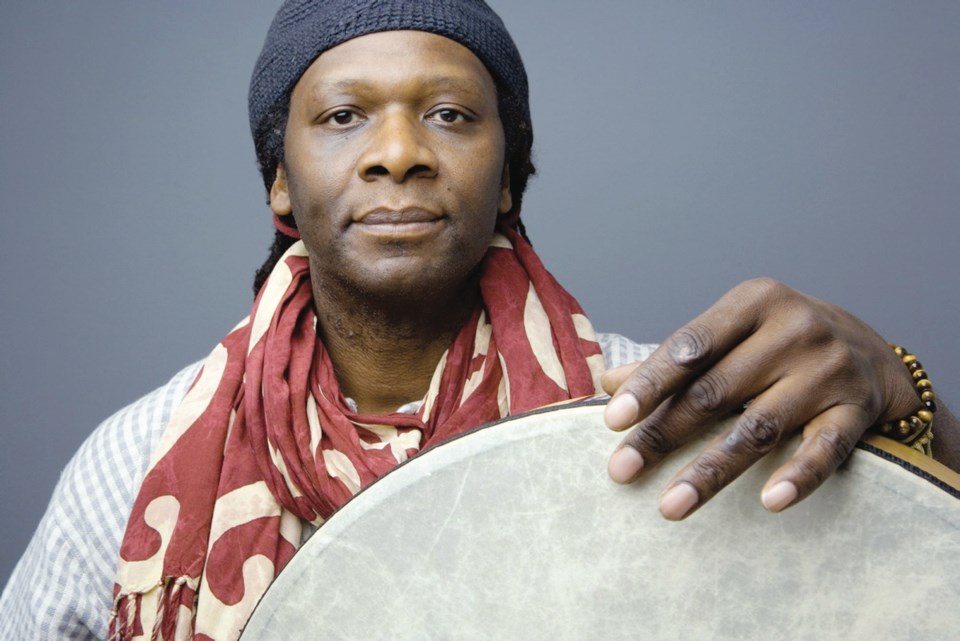IN CONCERT
What: Hamid Drake with Brodie West
When: Friday, 8 p.m.
Where: Martin Batchelor Gallery, 712 Cormorant St.
Tickets: $20 at eventbrite.ca
Free jazz is known as an improvisational strain of avant-garde music, which has always struck one of its foremost practitioners, percussionist Hamid Drake, as something of a misnomer.
“First, we’ve got to take ‘jazz’ out of there,” Drake said, in an interview from his home in Chicago.
“Jazz by its very nature is based upon a lot of constructs. It’s not free in the usual sense. When you’ve got a jazz academy, you’re not necessarily learning how to find your way on your own instrument. You’re learning very conservative, very constructed forms.”
Free jazz is better explained as improvisational music, where instruments often sound at odds with each other to the untrained ear. The reality is more complicated, said Drake, who is coming to Victoria on Friday for a performance with Nanaimo-raised saxophonist Brodie West. The concert at Martin Batchelor Gallery is billed as An Evening of Solos and Duets, which combines two of Drake’s preferred styles of playing.
Free-jazz players are defined by their refusal to conform. In order to reach this level, however, they must shut out the noise of the outside world. “It’s the hardest thing in life, whether we’re talking about music or art in general, to be free of pre-conceived notions, biases and prejudices,” Drake said.
Drake, who was voted 2017 percussionist of the year by critics at the venerable jazz magazine Downbeat, does not limit his playing to free jazz. He has extensive experience playing in reggae and world music, and has worked with some giants of modern music, including Herbie Hancock, Don Cherry, Pharaoh Sanders, Wayne Shorter and Bill Laswell.
He spends the better part of the year on the road in a variety of musical ensembles.
Drake started out primarily as a collaborator, working with Cherry extensively for nearly 20 years. He branched out for several recordings, as a collaborator in separate groups led by saxophonist Fred Anderson and bassist William Parker, before taking the reins himself and putting his name on record titles in 2010.
“When I worked with Don Cherry, one of the things he said was: ‘Style can be the death of creativity if you think your style is greater than any other.’ That kind of influenced me to look into the great tradition of music, and not just one particular thing.”
Drake has never put out a solo record, though he’s working on one. He makes the majority of his living on the road playing with others, including some of the heavyweights of the European free-jazz community. Drake said he heads to Europe eight or 10 times a year. He recently returned from playing the 2,400-seat Philharmonie de Paris with saxophonist Archie Shepp.
“Europe is primarily my employer right now, and the employer of quite a few musicians from the United States. In Canada, you guys are still putting quite a bit of funding into the arts. We’re the opposite here.”
Drake has a longstanding friendship and creative partnership with reedist Peter Brötzmann of Germany, who pioneered the European free-jazz scene of the 1960s. Brötzmann, who is known for his radical thinking and aggressive playing, once suggested that the best shows are those with a vast amount of tension between the performer and his or her ticket-buying public.
Drake agrees, saying tension between audience and artist is a positive thing — despite the fact the word often has a negative connotation.
“We’re sharing the same energetic space, and oftentimes, the musicians are under the misconception that they are the only ones creating that space. But that’s not true. The space is created by the shared energy of both those that are listening and those that are playing. It keeps shifting. Neither of us are the creator of that energy — we’re simply tapping into it.”



